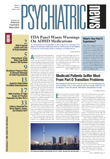A proposed change in the way buprenorphine is listed internationally as a controlled substance could result in a rescheduling of the medication under the Controlled Substances Act in the United States.
The proposed change would likely result in buprenorphine being classified as a Schedule II controlled substance rather than a Schedule III substance, as it is now. That seemingly innocuous change “could lead to the elimination of office-based buprenorphine therapy for opioid addiction and severely restrict treatment access for patients,” according to APA comments submitted to the U.S. Food and Drug Administration (FDA) on December 13, 2005.
The FDA had invited submission of comments on the potential international rescheduling of nine substances, including buprenorphine. That solicitation was a result of an October 2005 notification from the World Health Organization (WHO) asking member states for input on the use of the nine substances in individual member countries and the impact of proposed international scheduling.
In collaboration with the United Nations, the WHO provides expertise in updating the list of drugs of abuse under the 1961 Single Convention on Narcotic Drugs and the 1971 Convention on Psychotropic Substances. The WHO provides advice and guidance on psychotropic and narcotic substances in accordance with WHO's mandate under international treaties.
Three international drug control treaties now provide the legal basis for the international prevention of drug abuse.
The WHO undertakes medical and scientific review of psychotropic and narcotic substances before the United Nations Commission on Narcotic Drugs makes decisions on the control status of these substances.
Since 1949, through its Expert Committee on Drug Dependence, the WHO has reviewed more than 400 substances. Between 1948, when the WHO was established, and 1999, the number of narcotic drugs under international control increased from 18 to 118, and the number of psychotropic substances from 32 to 111.
With regard to buprenorphine, the WHO requested input on the impact of transferring the drug from its current listing on Schedule III of the Convention on Psychotropic Substances, 1971, to Schedule I of the Single Convention on Narcotic Drugs, 1961—a move that could place more restrictive international controls on the use of buprenorphine.
Specifically, WHO asked, “do you think that [buprenorphine's] availability for medical use will be affected? If yes, how do you think the transfer will impact its medical availablility?”
APA stated in its comments that the proposed change could have a“ chilling effect on access to buprenorphine, to the extent that international drug scheduling influences individual countries' choices of how to control buprenorphine.”
Given the influence of the international scheduling of substances,“ the likely result of international rescheduling would be reduced access to buprenorphine for legitimate medical purposes. There is a potential for such a scheduling change to affect domestic drug classification of buprenorphine from [the U.S. Controlled Substances Act] Schedule III to Schedule II, which could lead to the elimination of office-based buprenorphine therapy and severely restrict treatment access for patients.”
More information on the WHO's input on international control of narcotics and psychotropic drugs is posted at<www.who.int/medicines/areas/quality_safety/psycotrop_narcotics_intro/en/>.▪
